Desklib - Online Library for Study Material and Solved Assignments
VerifiedAdded on 2022/11/26
|14
|643
|448
AI Summary
Desklib is an online library that offers study material and solved assignments for various subjects and courses. It includes portfolios on work breakdown structure, use case diagram, class diagram, ER diagram, state machine diagram, sequence diagram, activity diagram, system architecture, testing activities, and deployment testing. The content also covers topics such as hospital management system, user interface, and testing strategies.
Contribute Materials
Your contribution can guide someone’s learning journey. Share your
documents today.
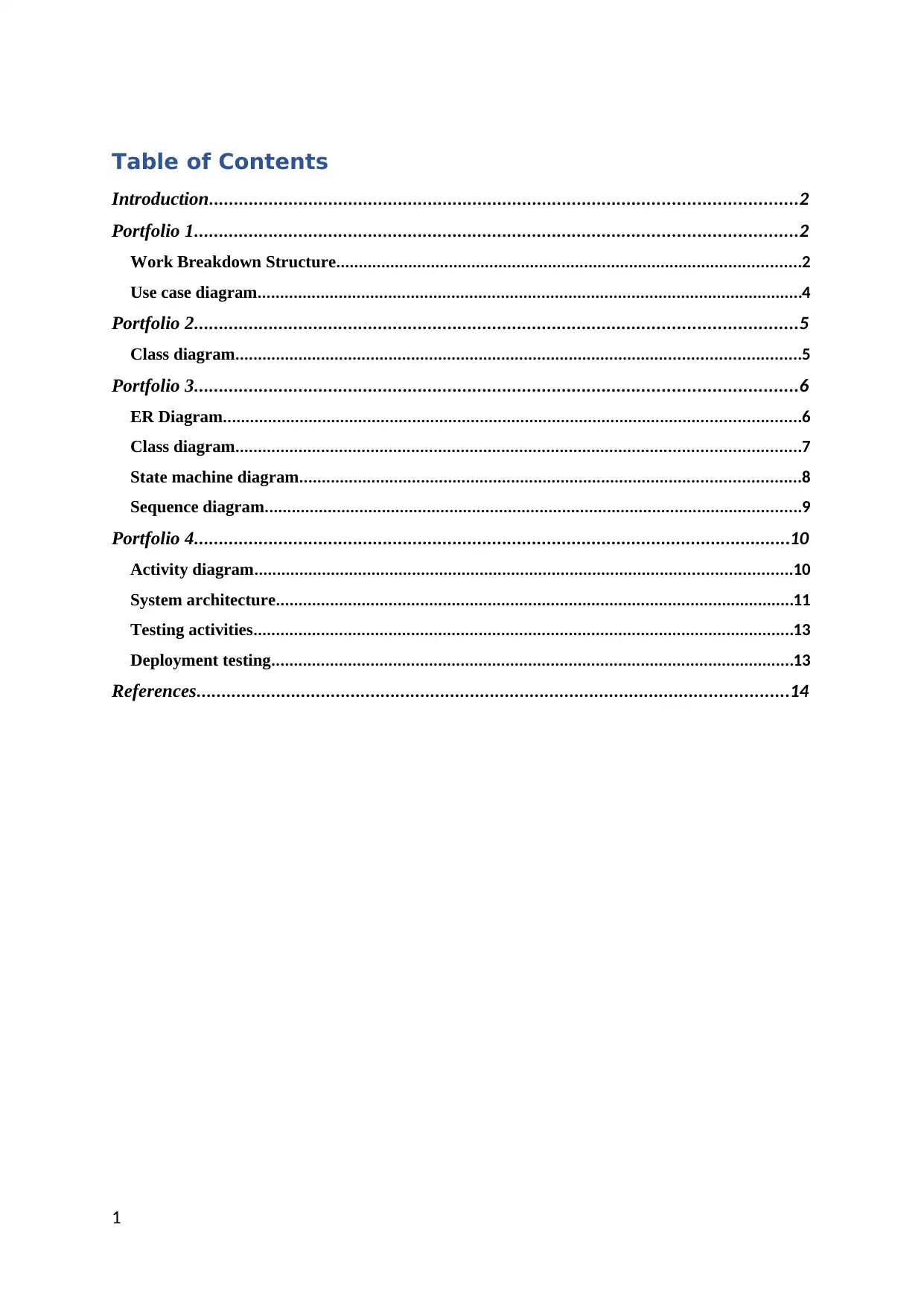
Table of Contents
Introduction......................................................................................................................2
Portfolio 1.........................................................................................................................2
Work Breakdown Structure.......................................................................................................2
Use case diagram.........................................................................................................................4
Portfolio 2.........................................................................................................................5
Class diagram.............................................................................................................................5
Portfolio 3.........................................................................................................................6
ER Diagram................................................................................................................................6
Class diagram.............................................................................................................................7
State machine diagram...............................................................................................................8
Sequence diagram.......................................................................................................................9
Portfolio 4........................................................................................................................10
Activity diagram.......................................................................................................................10
System architecture...................................................................................................................11
Testing activities........................................................................................................................13
Deployment testing....................................................................................................................13
References.......................................................................................................................14
1
Introduction......................................................................................................................2
Portfolio 1.........................................................................................................................2
Work Breakdown Structure.......................................................................................................2
Use case diagram.........................................................................................................................4
Portfolio 2.........................................................................................................................5
Class diagram.............................................................................................................................5
Portfolio 3.........................................................................................................................6
ER Diagram................................................................................................................................6
Class diagram.............................................................................................................................7
State machine diagram...............................................................................................................8
Sequence diagram.......................................................................................................................9
Portfolio 4........................................................................................................................10
Activity diagram.......................................................................................................................10
System architecture...................................................................................................................11
Testing activities........................................................................................................................13
Deployment testing....................................................................................................................13
References.......................................................................................................................14
1
Secure Best Marks with AI Grader
Need help grading? Try our AI Grader for instant feedback on your assignments.
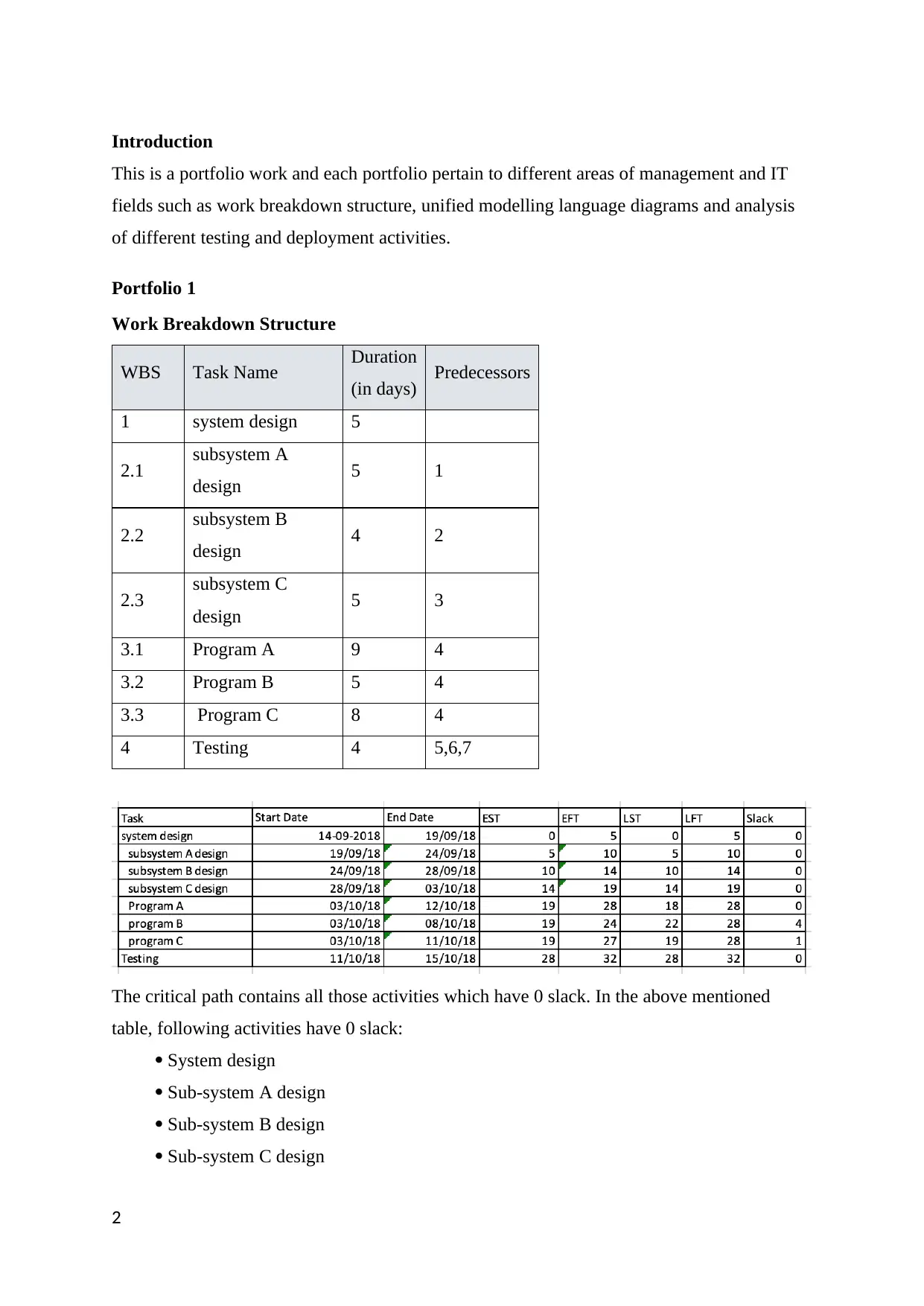
Introduction
This is a portfolio work and each portfolio pertain to different areas of management and IT
fields such as work breakdown structure, unified modelling language diagrams and analysis
of different testing and deployment activities.
Portfolio 1
Work Breakdown Structure
WBS Task Name Duration
(in days) Predecessors
1 system design 5
2.1 subsystem A
design 5 1
2.2 subsystem B
design 4 2
2.3 subsystem C
design 5 3
3.1 Program A 9 4
3.2 Program B 5 4
3.3 Program C 8 4
4 Testing 4 5,6,7
The critical path contains all those activities which have 0 slack. In the above mentioned
table, following activities have 0 slack:
System design
Sub-system A design
Sub-system B design
Sub-system C design
2
This is a portfolio work and each portfolio pertain to different areas of management and IT
fields such as work breakdown structure, unified modelling language diagrams and analysis
of different testing and deployment activities.
Portfolio 1
Work Breakdown Structure
WBS Task Name Duration
(in days) Predecessors
1 system design 5
2.1 subsystem A
design 5 1
2.2 subsystem B
design 4 2
2.3 subsystem C
design 5 3
3.1 Program A 9 4
3.2 Program B 5 4
3.3 Program C 8 4
4 Testing 4 5,6,7
The critical path contains all those activities which have 0 slack. In the above mentioned
table, following activities have 0 slack:
System design
Sub-system A design
Sub-system B design
Sub-system C design
2
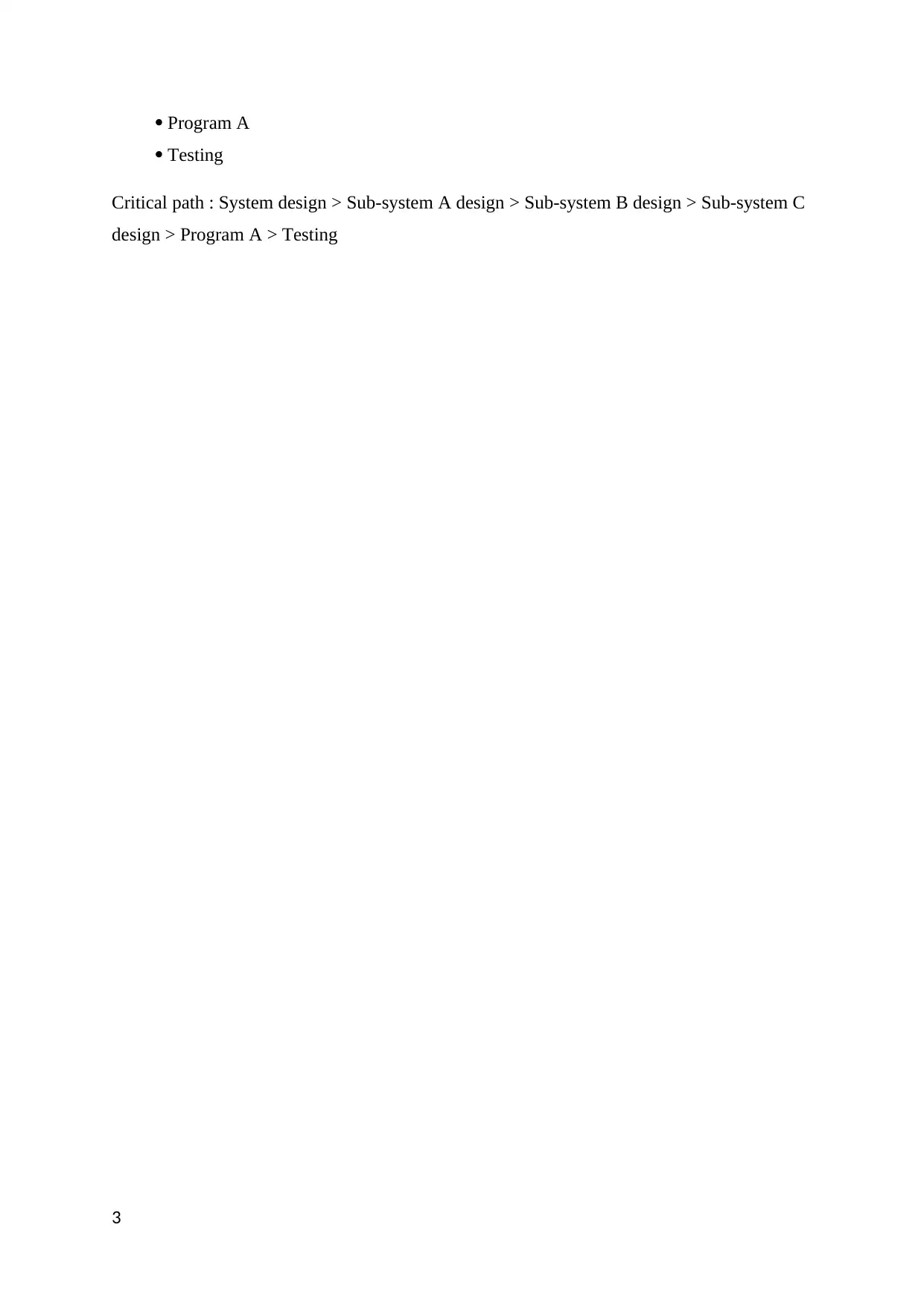
Program A
Testing
Critical path : System design > Sub-system A design > Sub-system B design > Sub-system C
design > Program A > Testing
3
Testing
Critical path : System design > Sub-system A design > Sub-system B design > Sub-system C
design > Program A > Testing
3
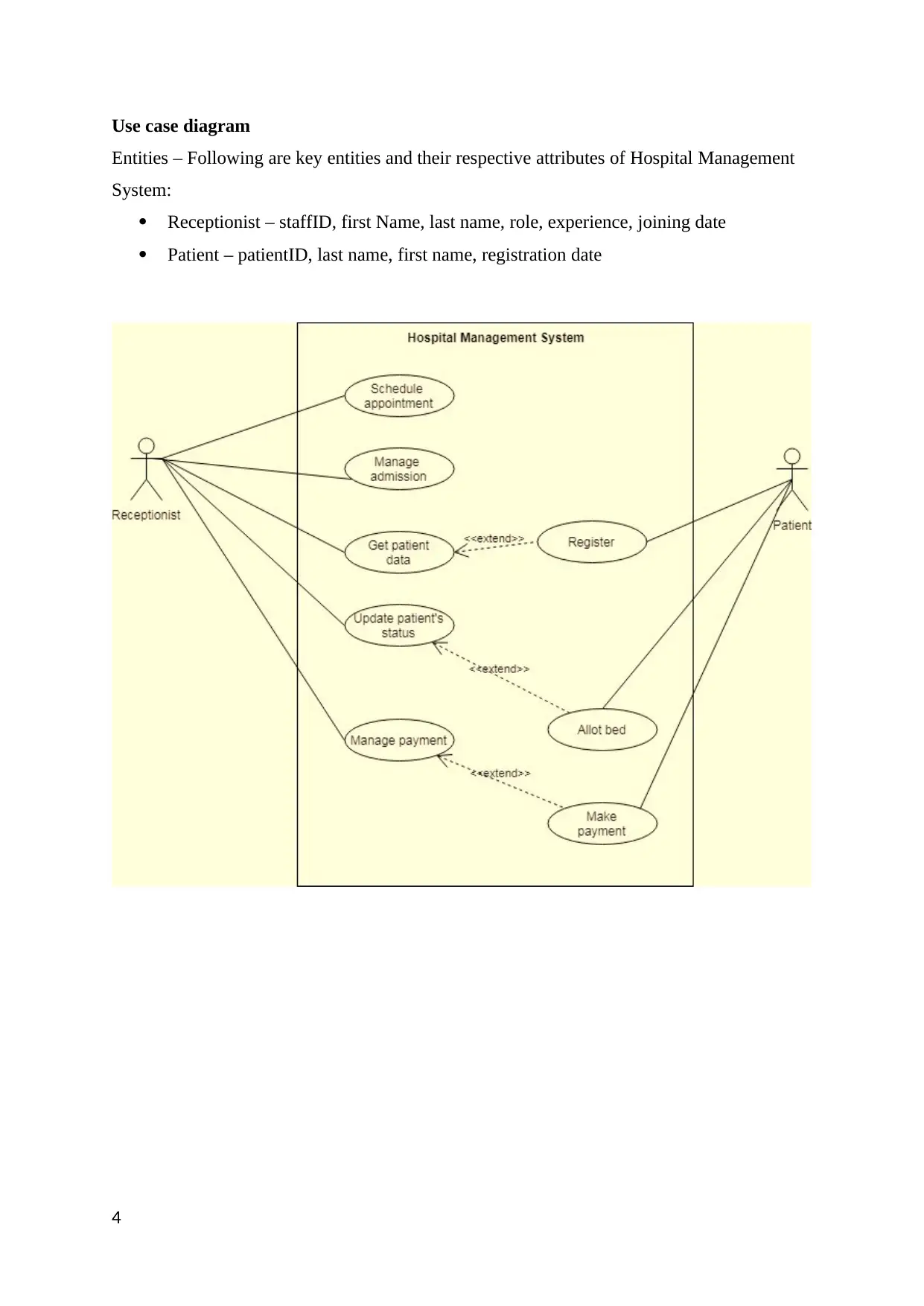
Use case diagram
Entities – Following are key entities and their respective attributes of Hospital Management
System:
Receptionist – staffID, first Name, last name, role, experience, joining date
Patient – patientID, last name, first name, registration date
4
Entities – Following are key entities and their respective attributes of Hospital Management
System:
Receptionist – staffID, first Name, last name, role, experience, joining date
Patient – patientID, last name, first name, registration date
4
Secure Best Marks with AI Grader
Need help grading? Try our AI Grader for instant feedback on your assignments.
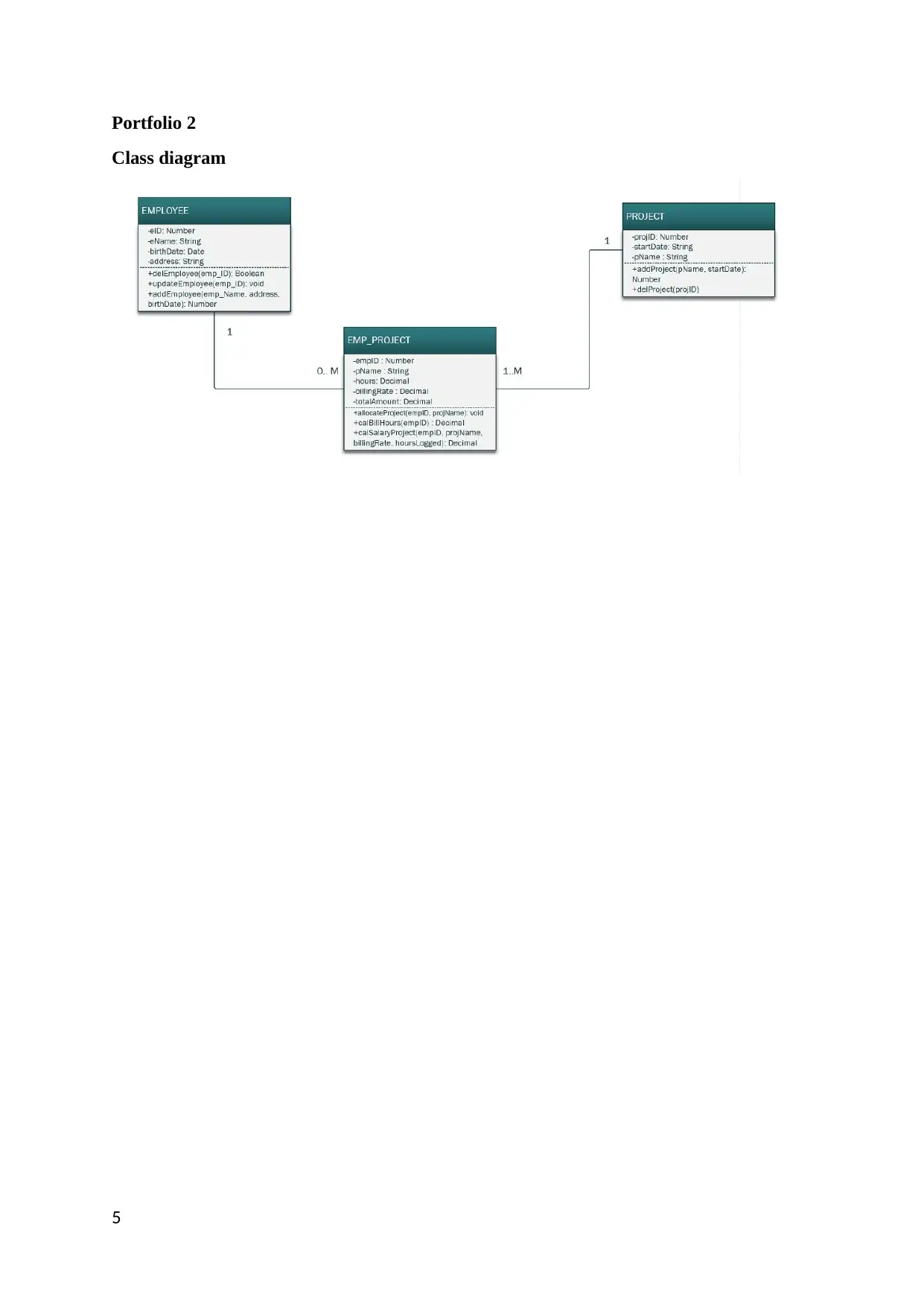
Portfolio 2
Class diagram
5
Class diagram
5
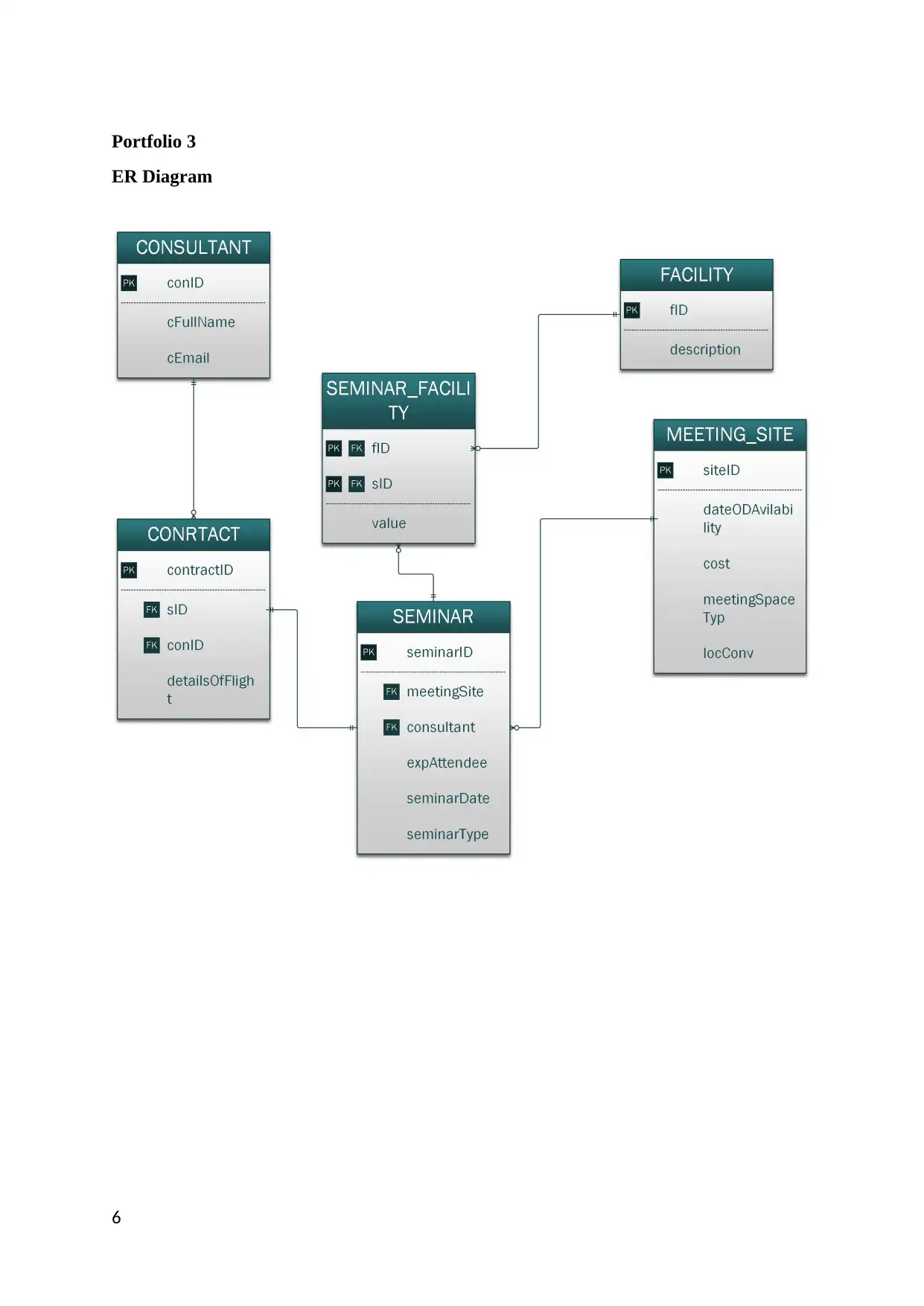
Portfolio 3
ER Diagram
6
ER Diagram
6
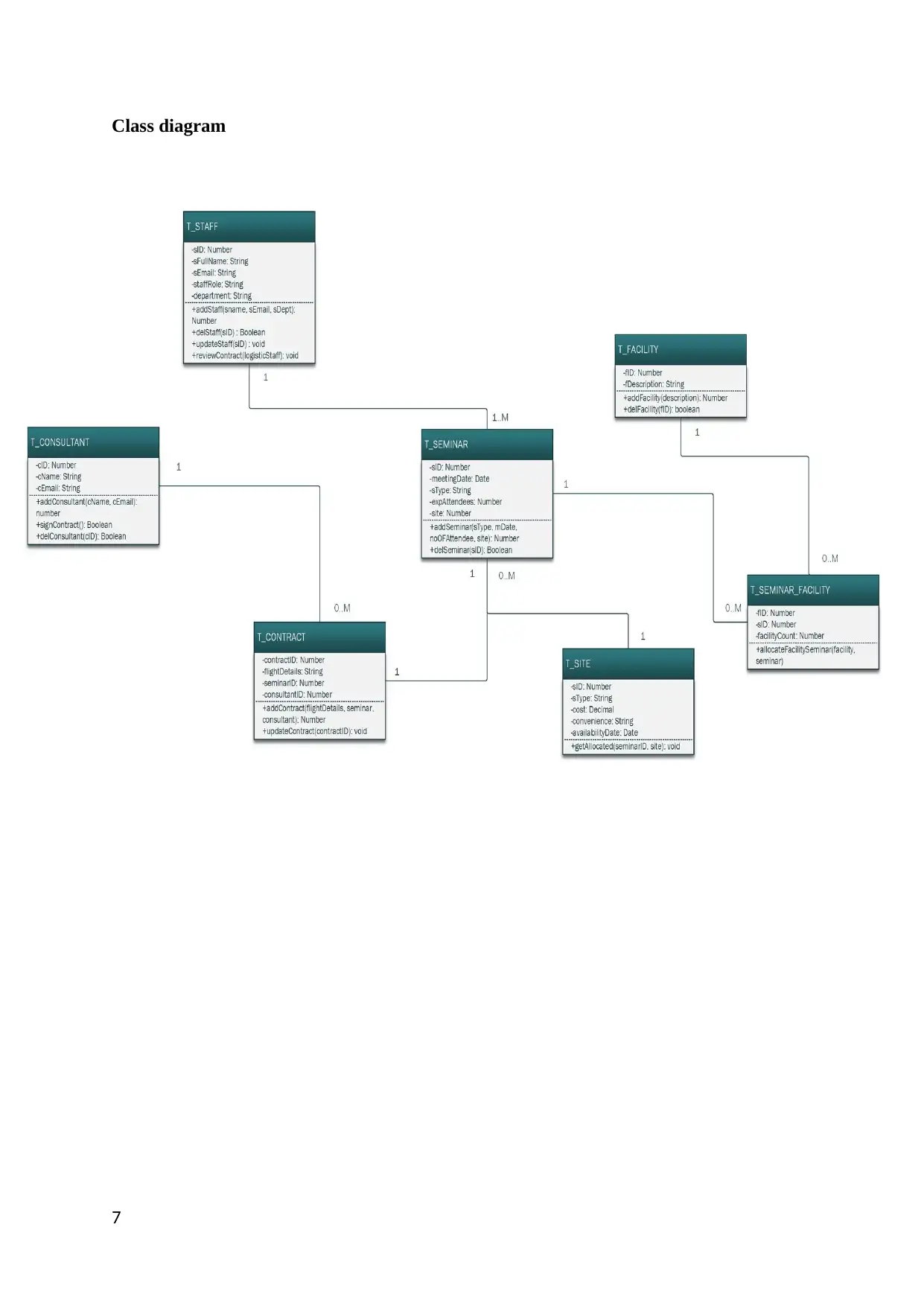
Class diagram
7
7
Paraphrase This Document
Need a fresh take? Get an instant paraphrase of this document with our AI Paraphraser
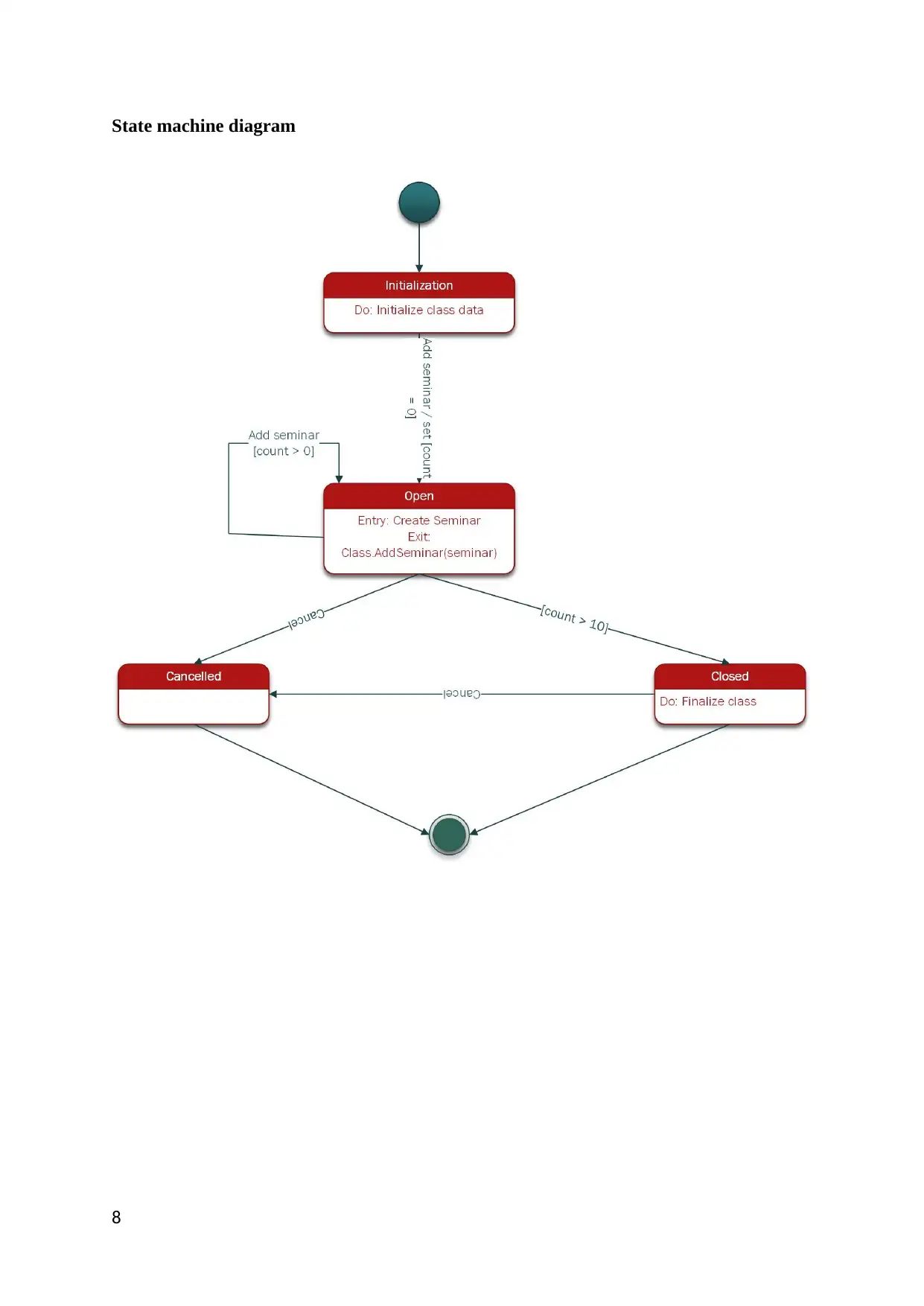
State machine diagram
8
8
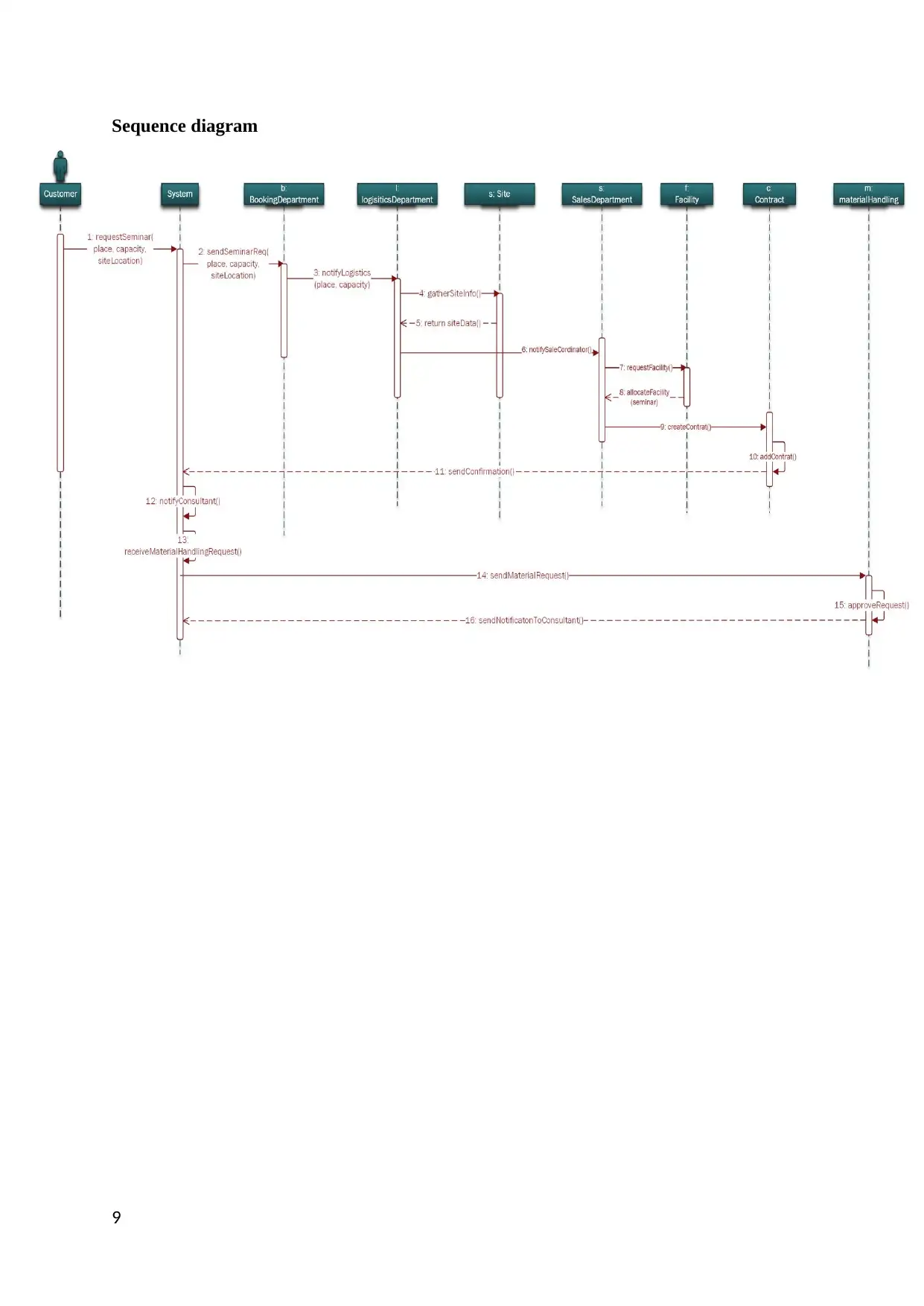
Sequence diagram
9
9
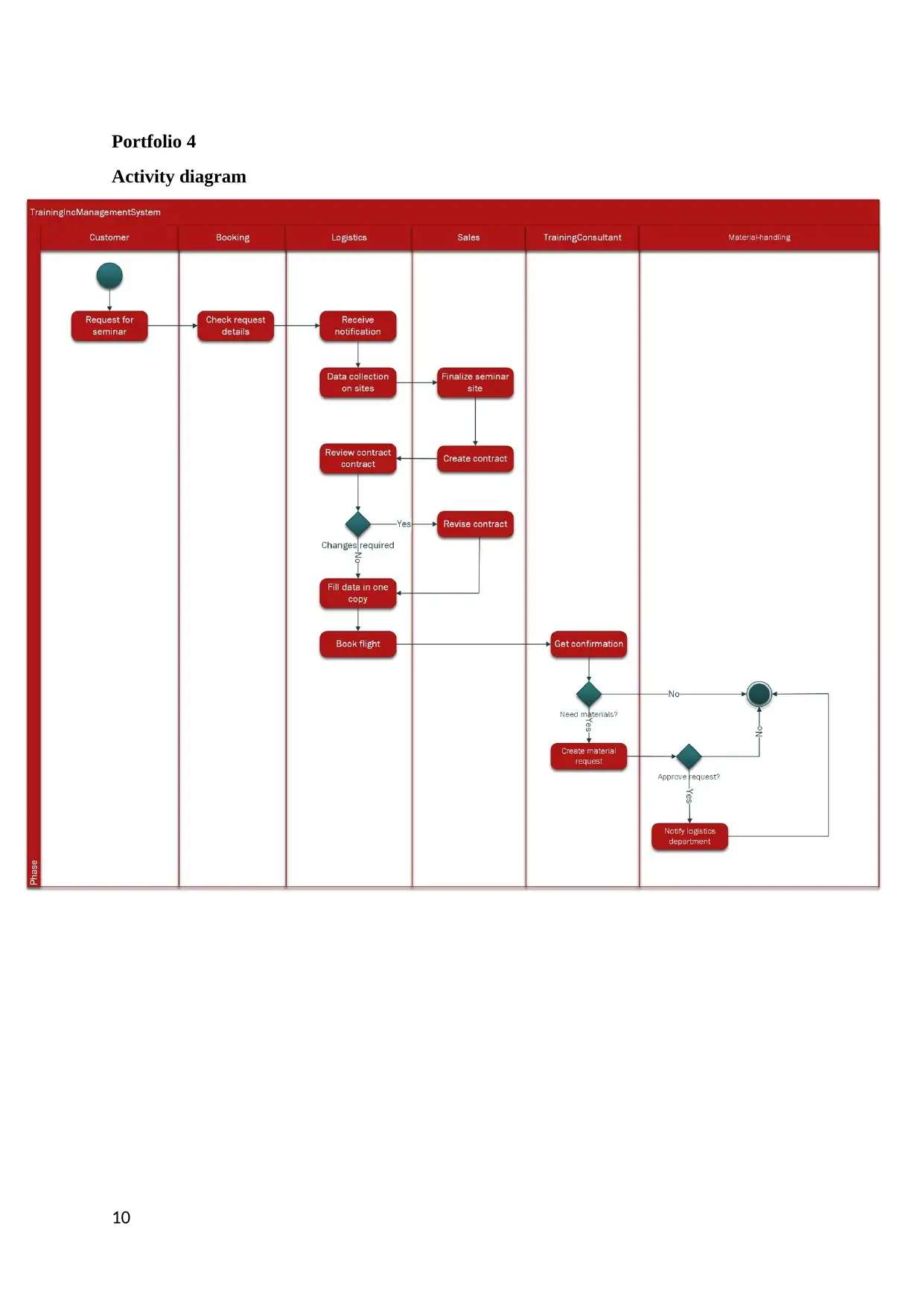
Portfolio 4
Activity diagram
10
Activity diagram
10
Secure Best Marks with AI Grader
Need help grading? Try our AI Grader for instant feedback on your assignments.
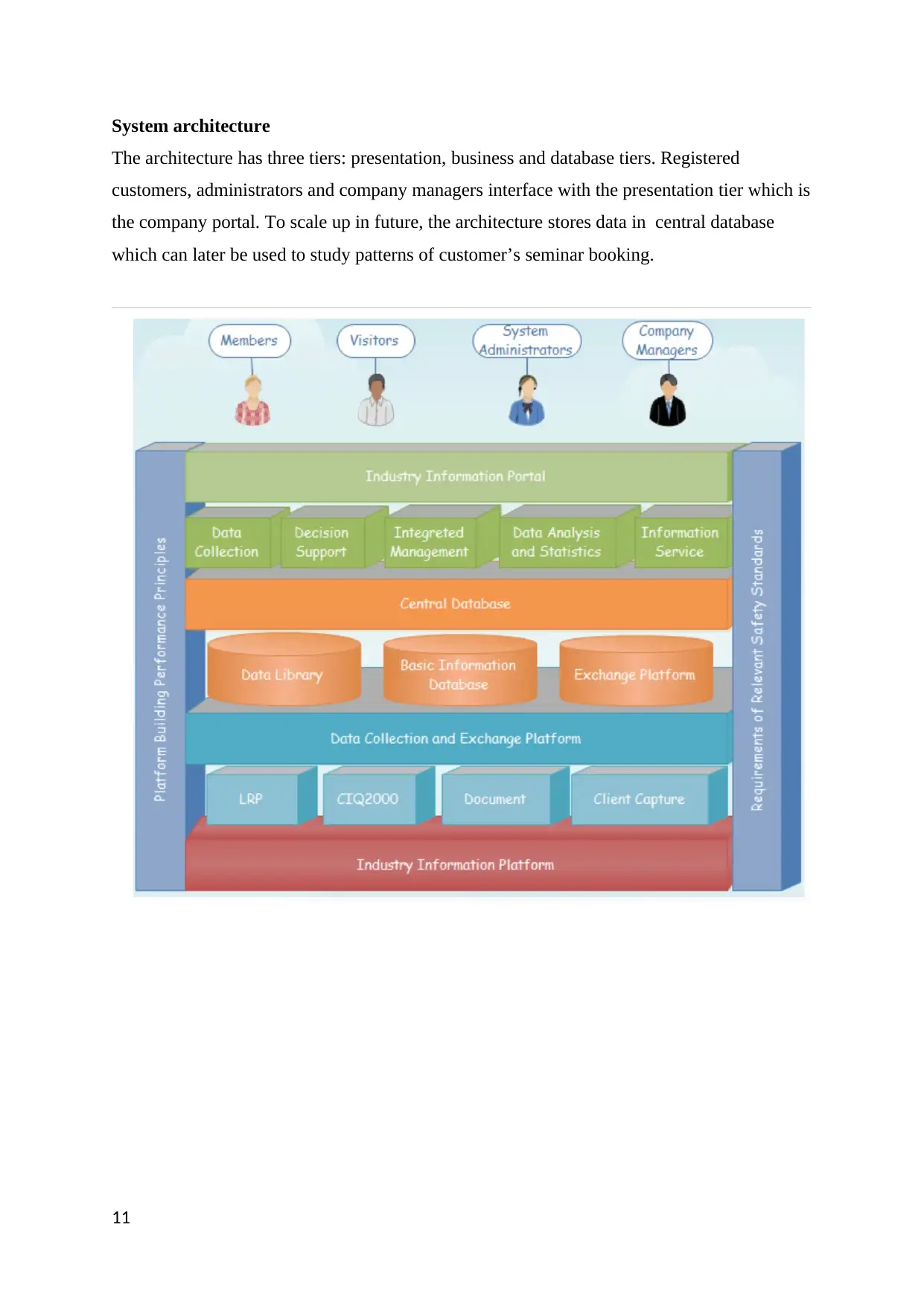
System architecture
The architecture has three tiers: presentation, business and database tiers. Registered
customers, administrators and company managers interface with the presentation tier which is
the company portal. To scale up in future, the architecture stores data in central database
which can later be used to study patterns of customer’s seminar booking.
11
The architecture has three tiers: presentation, business and database tiers. Registered
customers, administrators and company managers interface with the presentation tier which is
the company portal. To scale up in future, the architecture stores data in central database
which can later be used to study patterns of customer’s seminar booking.
11
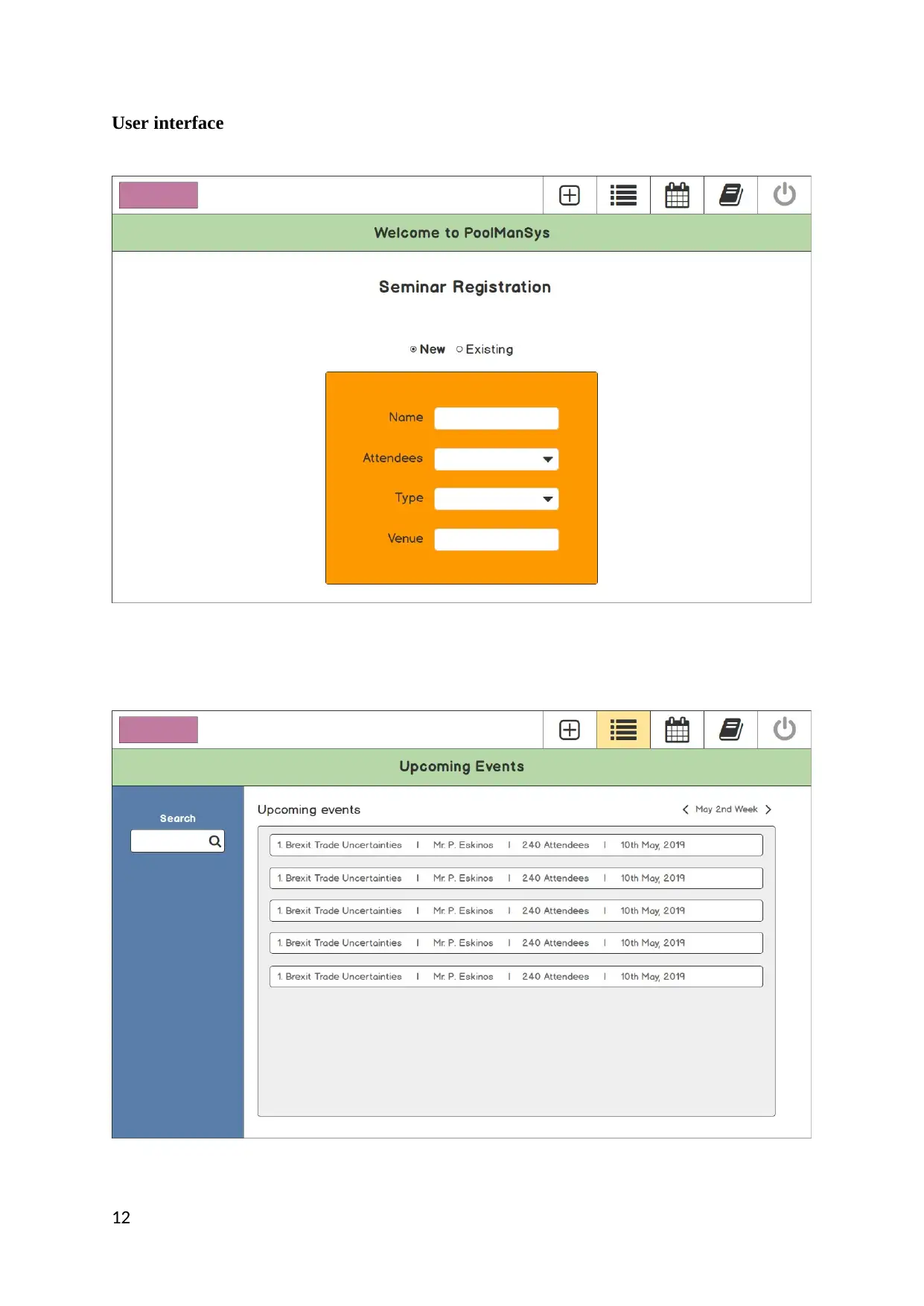
User interface
12
12
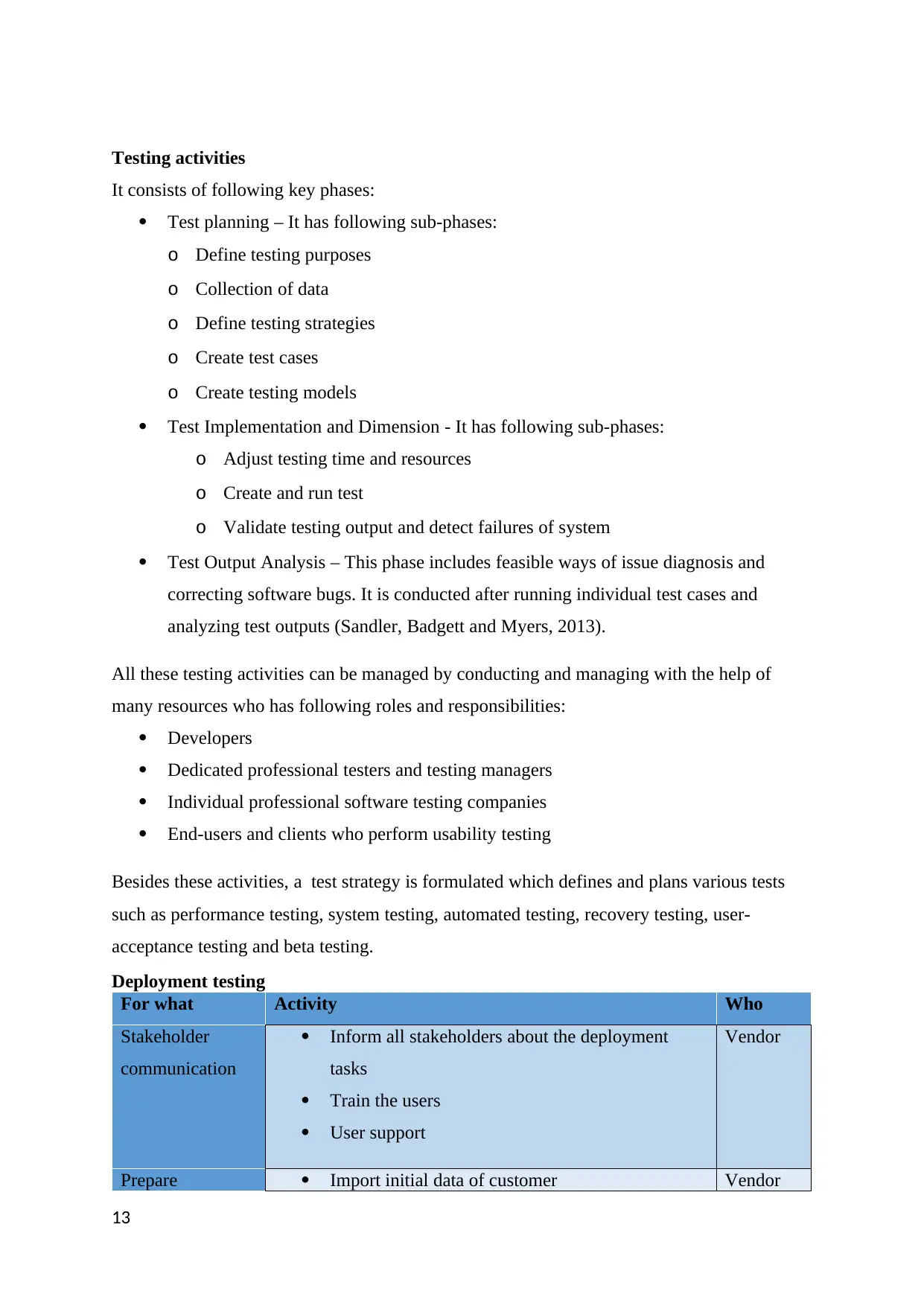
Testing activities
It consists of following key phases:
Test planning – It has following sub-phases:
o Define testing purposes
o Collection of data
o Define testing strategies
o Create test cases
o Create testing models
Test Implementation and Dimension - It has following sub-phases:
o Adjust testing time and resources
o Create and run test
o Validate testing output and detect failures of system
Test Output Analysis – This phase includes feasible ways of issue diagnosis and
correcting software bugs. It is conducted after running individual test cases and
analyzing test outputs (Sandler, Badgett and Myers, 2013).
All these testing activities can be managed by conducting and managing with the help of
many resources who has following roles and responsibilities:
Developers
Dedicated professional testers and testing managers
Individual professional software testing companies
End-users and clients who perform usability testing
Besides these activities, a test strategy is formulated which defines and plans various tests
such as performance testing, system testing, automated testing, recovery testing, user-
acceptance testing and beta testing.
Deployment testing
For what Activity Who
Stakeholder
communication
Inform all stakeholders about the deployment
tasks
Train the users
User support
Vendor
Prepare Import initial data of customer Vendor
13
It consists of following key phases:
Test planning – It has following sub-phases:
o Define testing purposes
o Collection of data
o Define testing strategies
o Create test cases
o Create testing models
Test Implementation and Dimension - It has following sub-phases:
o Adjust testing time and resources
o Create and run test
o Validate testing output and detect failures of system
Test Output Analysis – This phase includes feasible ways of issue diagnosis and
correcting software bugs. It is conducted after running individual test cases and
analyzing test outputs (Sandler, Badgett and Myers, 2013).
All these testing activities can be managed by conducting and managing with the help of
many resources who has following roles and responsibilities:
Developers
Dedicated professional testers and testing managers
Individual professional software testing companies
End-users and clients who perform usability testing
Besides these activities, a test strategy is formulated which defines and plans various tests
such as performance testing, system testing, automated testing, recovery testing, user-
acceptance testing and beta testing.
Deployment testing
For what Activity Who
Stakeholder
communication
Inform all stakeholders about the deployment
tasks
Train the users
User support
Vendor
Prepare Import initial data of customer Vendor
13
Paraphrase This Document
Need a fresh take? Get an instant paraphrase of this document with our AI Paraphraser
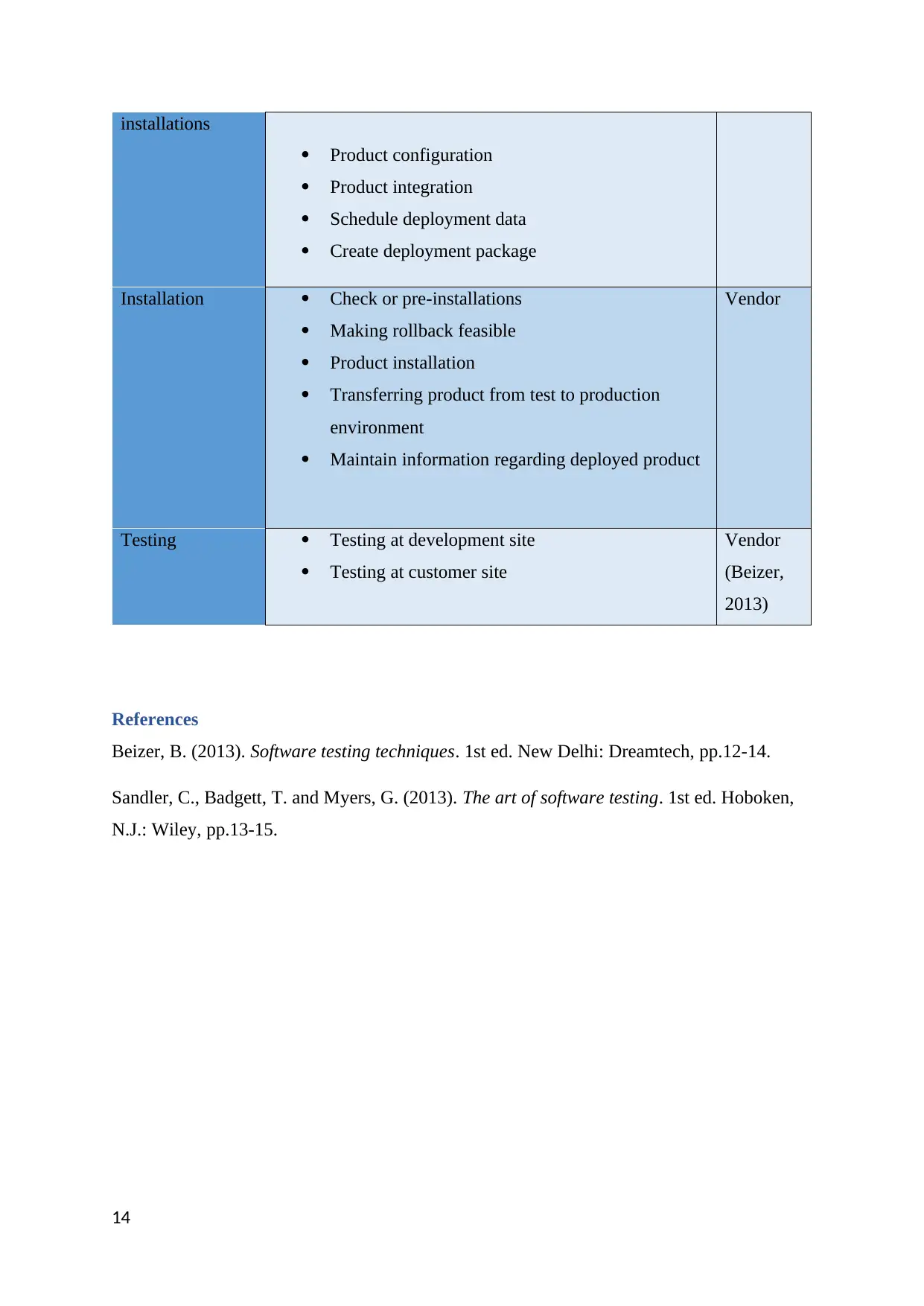
installations
Product configuration
Product integration
Schedule deployment data
Create deployment package
Installation Check or pre-installations
Making rollback feasible
Product installation
Transferring product from test to production
environment
Maintain information regarding deployed product
Vendor
Testing Testing at development site
Testing at customer site
Vendor
(Beizer,
2013)
References
Beizer, B. (2013). Software testing techniques. 1st ed. New Delhi: Dreamtech, pp.12-14.
Sandler, C., Badgett, T. and Myers, G. (2013). The art of software testing. 1st ed. Hoboken,
N.J.: Wiley, pp.13-15.
14
Product configuration
Product integration
Schedule deployment data
Create deployment package
Installation Check or pre-installations
Making rollback feasible
Product installation
Transferring product from test to production
environment
Maintain information regarding deployed product
Vendor
Testing Testing at development site
Testing at customer site
Vendor
(Beizer,
2013)
References
Beizer, B. (2013). Software testing techniques. 1st ed. New Delhi: Dreamtech, pp.12-14.
Sandler, C., Badgett, T. and Myers, G. (2013). The art of software testing. 1st ed. Hoboken,
N.J.: Wiley, pp.13-15.
14
1 out of 14
Related Documents
Your All-in-One AI-Powered Toolkit for Academic Success.
+13062052269
info@desklib.com
Available 24*7 on WhatsApp / Email
![[object Object]](/_next/static/media/star-bottom.7253800d.svg)
Unlock your academic potential
© 2024 | Zucol Services PVT LTD | All rights reserved.




